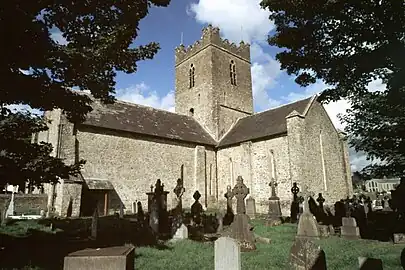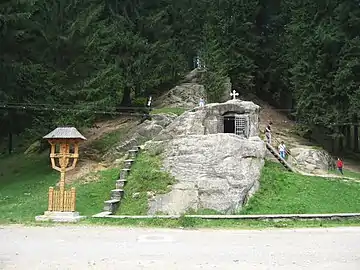December 18 (Eastern Orthodox liturgics)
December 17 - Eastern Orthodox liturgical calendar - December 19
All fixed commemorations below celebrated on December 31 by Eastern Orthodox Churches on the Old Calendar.[note 1]
For December 18th, Orthodox Churches on the Old Calendar commemorate the Saints listed on December 5.
Saints
- Martyr Eubotius, at Cyzicus (320)[1]
- Martyrs Phocas and Hermilas, by the sword.[2][3]
- Hieromartyrs Zacchaeus, Deacon, and Alphaeus, reader, at Caesarea.[3][4] (see also November 18)
- Hieromartyr Modestus I, Archbishop of Jerusalem (389)[5][6][7][note 2] (see also December 16 - Modestus II)
- Saint Florus, Bishop of Amisus (7th century)[8][9]
- Saint Michael the Confessor, at Constantinople (845)[10][11]
- Saint Sophia the Wonderworker.[3][12][note 3]
- Venerable Nomon.[13][note 4]
Pre-Schism Western saints
- Martyrs Rufus and Zosimus, at Philippi in Macedonia (c. 107)[14][15][note 5]
- Martyr Moses (Moysetes), a martyr in North Africa who probably suffered under Decius (c. 250)[14][15][note 6]
- Martyrs Quintus, Simplicius and Companions, in North Africa under the Emperors Decius and Valerian (c. 255)[14][15]
- Martyrs Victurus, Victor, Victorinus, Adjutor, Quartus and 30 other companions, in North Africa.[14][15]
- Martyr Sebastian, at Rome, and his companions:
- Saint Gatianus of Tours, first Bishop of Tours (3rd century)[14][note 7]
- Saint Bodagisil, founded and was the first Abbot of a monastery on the Meuse in Belgium (588)[14]
- Saint Samthann, foundress of the convent of Clonbroney in Co. Longford in Ireland (6th century)[14]
- Saint Flannán, first Bishop of Killaloe in Ireland (7th century)[14][note 8]
- Saint Desiderius of Fontenelle (Desideratus), son of St Waningus (700)[14][note 9]
- Saint Winebald (Winibald), Abbot of Heidenheim and Bishop of Eichstatt (Germany) (761)[14][note 10]
Post-Schism Orthodox saints
- Saint Daniel the Hesychast (Daniil Sihastrul), of Voroneț Monastery, Romania (15th century)[3][20][note 11]
- Venerable Sebastian, Abbot of Poshekhonye Monastery (Vologda) (1500)[22][23]
New martyrs and confessors
- Martyr Victor Matveev (1936)[24][25]
- New Hieromartyr Thaddeus (Uspensky), Archbishop of Tver (1937)[23][24][26]
- New Hieromartyr Nicholas (Klementiev), Archbishop of Great Ustiug (Velikoustiuzh) (1937)[3][23][24][25]
- New Hieromartyrs (1937):
- New Hieromartyr Sergius Astakhov, Deacon (1942)[24][25]
- Virgin-martyr Vera Truks of Zhitomir (1942)[24][25]
Other commemorations
- Consecration of the Church of the Theotokos in Halkoprateia-Constantinople.[27]
- Glorification (1694) of Righteous Simeon, Wonderworker of Verkhoturye (1642)[23][28]
- Repose of Schemanun Nazaria, Eldress of Varatec Monastery (Romania) (1814)[23]
- Second Finding of the Wonderworking Icon of Panagia Evangelistria of Tinos (1842)[29] (see also: January 30)
- Repose of Metropolitan Benjamin (Costachi) of Moldavia (1846)[23]
- Slaying of Hieromonk Nestor of Zharki (Ivanovo) (1993)[23]
Gallery
.jpg.webp) St. Sebastian.
St. Sebastian. St. Sebastian and the arrows.
St. Sebastian and the arrows. St. Flannans Cathedral, Killaloe
St. Flannans Cathedral, Killaloe Cell of St. Daniel the Hesychast (Daniil Sihastrul).
Cell of St. Daniel the Hesychast (Daniil Sihastrul).
Notes
- The notation Old Style or (OS) is sometimes used to indicate a date in the Julian Calendar (which is used by churches on the "Old Calendar").
The notation New Style or (NS), indicates a date in the Revised Julian calendar (which is used by churches on the "New Calendar"). - "The parents of Saint Modestus, pious Christians from Sebaste in Asia Minor, died in prison during Maximian's persecution (c. 305) while their son was in his infancy... ...When he went on pilgrimage to Jerusalem, the doors of the Church of the Holy Sepulchre opened at his prayer, to the jubilation of the people who, at this sign, chose Modestus to be Archbishop of the Mother of the Churches and successor of Saint James... ...Such was his favor with God that not only did he heal the bodily and spiritual diseases of his faithful, but he also wrought countless miracles for their oxen and mules and other domestic animals. To this day, it is the custom on the feast of Saint Modestus to sprinkle byres, stables and even houses with holy water in order to secure his protection. It is said that, after many years full of miracles and of contests for virtue, Saint Modestus was handed over to the pagans by the Jews, and that he was beheaded after enduring numerous torments."[5]
- (in Greek): Δὲν ἔχουμε καμία πληροφορία γιὰ τὴν ζωή της, μόνο τὸ δίστιχο: «Θεοῦ σοφίαν ἠγάπησε Σοφία, ὅθεν χάριν δέδεκτο καὶ τῶν θαυμάτων».
- His memory is referenced only briefly in the Small Euchologion, in the edition printed by the Apostoliki Diakonia in 1956, without any other information. He is probably a Saint of the Cypriot Church.
- Citizens of Philippi brought to Rome with St Ignatius of Antioch and thrown to the beasts in the Roman amphitheatre two days before the latter's martyrdom. According to the Roman Martyrology, they "were of the number of the disciples, by whom the primitive church was founded among the Jews and the Greeks. Their happy martyrdom is mentioned by St. Polycarp, in his epistle to the Philippians."[15]
- "S. CORNELIUS, in his letter to Fabius of Antioch about Novatus, says that the heretic was excommunicated by "Moyses, the blessed witness who but lately endured a glorious and wonderful martyrdom, and who, whist yet among the living, seeing the audacity and folly of the man, excluded him from communion."[16]
- He was venerated as a disciple of St Dionysius of Paris and the first Bishop of Tours in France.
- He also worked in the Hebrides and elsewhere. He managed to recite the whole Psalter every day.
- Son of St Waningus, the founder of the monastery of Fécamp, he became a monk at Fontenelle in the north of France. His relics were enshrined in Ghent in Belgium.
- Born in England, he was the brother of Sts Willibald and Walburgh. While on pilgrimage to the Holy Land with his brother Winebald, he was taken ill and remained in Rome. Eventually he returned to England and went to Germany where he became Abbot of Heidenheim and then Bishop of Eichstätt.
- He labored in asceticism in a Bukovina monastery and later settled in a secluded area. Many came to him, including the Moldovan ruler Stefan III. He refused an appointment to the See of Moldova and founded the Voronets Monastery.[21]
References
- Great Synaxaristes: (in Greek): Ὁ Ἅγιος Εὐβίωτος. 18 Δεκεμβρίου. ΜΕΓΑΣ ΣΥΝΑΞΑΡΙΣΤΗΣ.
- Great Synaxaristes: (in Greek): Οἱ Ἅγιοι Φωκᾶς καὶ Ἐρμύλος οἱ Μάρτυρες. 18 Δεκεμβρίου. ΜΕΓΑΣ ΣΥΝΑΞΑΡΙΣΤΗΣ.
- The Autonomous Orthodox Metropolia of Western Europe and the Americas (ROCOR). St. Hilarion Calendar of Saints for the year of our Lord 2004. St. Hilarion Press (Austin, TX). p.94.
- Great Synaxaristes: (in Greek): Οἱ Ἅγιοι Ζακχαῖος καὶ Ἀλφειὸς οἱ Μάρτυρες. 18 Δεκεμβρίου. ΜΕΓΑΣ ΣΥΝΑΞΑΡΙΣΤΗΣ.
- Hieromonk Makarios of Simonos Petra (Ed.). THE SYNAXARION: The Lives of the Saints of the Orthodox Church: VOLUME TWO - November, December. Transl. from the French by Christopher Hookway. Holy Convent of the Annunciation of Our Lady, Ormylia (Chalkidike), 1999. pp. 463-464.
- (in Greek) Συναξαριστής. 18 Δεκεμβρίου. ECCLESIA.GR. (H ΕΚΚΛΗΣΙΑ ΤΗΣ ΕΛΛΑΔΟΣ).
- Great Synaxaristes: (in Greek): Ὁ Ἅγιος Μοδεστὸς Ἀρχιεπίσκοπος Ἱεροσολύμων. 18 Δεκεμβρίου. ΜΕΓΑΣ ΣΥΝΑΞΑΡΙΣΤΗΣ.
- Great Synaxaristes: (in Greek): Ὁ Ὅσιος Φλῶρος. 18 Δεκεμβρίου. ΜΕΓΑΣ ΣΥΝΑΞΑΡΙΣΤΗΣ.
- St Florus the Bishop of Amisus. OCA - Feasts and Saints.
- Great Synaxaristes: (in Greek): Ὁ Ὅσιος Μιχαὴλ ὁ Ὁμολογητής καὶ Σύγκελος. 18 Δεκεμβρίου. ΜΕΓΑΣ ΣΥΝΑΞΑΡΙΣΤΗΣ.
- St Michael the Confessor at Constantinople. OCA - Feasts and Saints.
- Great Synaxaristes: (in Greek): Ἡ Ἁγία Σοφία ἡ Θαυματουργός. 18 Δεκεμβρίου. ΜΕΓΑΣ ΣΥΝΑΞΑΡΙΣΤΗΣ.
- Great Synaxaristes: (in Greek): Ὁ Ὅσιος Νόμων. 18 Δεκεμβρίου. ΜΕΓΑΣ ΣΥΝΑΞΑΡΙΣΤΗΣ.
- December 18. Latin Saints of the Orthodox Patriarchate of Rome.
- The Roman Martyrology. Transl. by the Archbishop of Baltimore. Last Edition, According to the Copy Printed at Rome in 1914. Revised Edition, with the Imprimatur of His Eminence Cardinal Gibbons. Baltimore: John Murphy Company, 1916. p.388.
- Rev. Sabine Baring-Gould (M.A.). "S. MOYSES, M. (END OF THIRD CENT.)" In: The Lives of the Saints. Volume the Fifteenth: December. London: John C. Nimmo, 1898. p. 219.
- Great Synaxaristes: (in Greek): Ὁ Ἅγιος Σεβαστιανὸς ὁ Μάρτυρας. 18 Δεκεμβρίου. ΜΕΓΑΣ ΣΥΝΑΞΑΡΙΣΤΗΣ.
- Great Synaxaristes: (in Greek): Οἱ Ἅγιοι Νικόστρατος, Ζωὴ ἡ σύζυγός του, Τραγκυλίνος καὶ ἡ σύζυγός του Μαρκία, Κλαύδιος, Τιβούρτιος, Κάστωρ, Καστοῦλος, Μάρκος καὶ Μαρκελλίνος οἱ Μάρτυρες. 18 Δεκεμβρίου. ΜΕΓΑΣ ΣΥΝΑΞΑΡΙΣΤΗΣ.
- Martyr Sebastian at Rome, and his companions. OCA - Feasts and Saints.
- Venerable Daniel the Hesychast. OCA - Feasts and Saints.
- 9 Romanian saints added to calendar of Russian Church. ORTHODOX CHRISTIANITY. March 13, 2018. Retrieved: May 15, 2018.
- Venerable Sebastian the Abbot of Pshekhonye Monastery, Vologda. OCA - Feasts and Saints.
- December 18/31. Orthodox Calendar (PRAVOSLAVIE.RU).
- December 31 / December 18. HOLY TRINITY RUSSIAN ORTHODOX CHURCH (A parish of the Patriarchate of Moscow).
- (in Russian) 18 декабря (ст.ст.) 31 декабря 2013 (нов. ст.). Русская Православная Церковь Отдел внешних церковных связей. (DECR).
- New Hieromartyr Archbishop Thaddeus of Tver. OCA - Feasts and Saints.
- Great Synaxaristes: (in Greek): Ἐγκαίνια Ναοῦ τῆς Θεοτόκου ἐν τοῖς Χαλκοπρατείοις. 18 Δεκεμβρίου. ΜΕΓΑΣ ΣΥΝΑΞΑΡΙΣΤΗΣ.
- Righteous Simeon the Wonderworker of Verkhoturye. OCA - Feasts and Saints.
- "The Second Finding of the Holy Icon of the Panagia Evangelistria in Tinos on December 18, 1842". Mystagogy Resource Center. Retrieved 2021-02-15.
Sources
- December 18/31. Orthodox Calendar (PRAVOSLAVIE.RU).
- December 31 / December 18. HOLY TRINITY RUSSIAN ORTHODOX CHURCH (A parish of the Patriarchate of Moscow).
- December 18. OCA - The Lives of the Saints.
- The Autonomous Orthodox Metropolia of Western Europe and the Americas (ROCOR). St. Hilarion Calendar of Saints for the year of our Lord 2004. St. Hilarion Press (Austin, TX). p. 94.
- December 18. Latin Saints of the Orthodox Patriarchate of Rome.
- The Roman Martyrology. Transl. by the Archbishop of Baltimore. Last Edition, According to the Copy Printed at Rome in 1914. Revised Edition, with the Imprimatur of His Eminence Cardinal Gibbons. Baltimore: John Murphy Company, 1916.
Greek Sources
- Great Synaxaristes: (in Greek) 18 ΔΕΚΕΜΒΡΙΟΥ. ΜΕΓΑΣ ΣΥΝΑΞΑΡΙΣΤΗΣ.
- (in Greek) Συναξαριστής. 18 Δεκεμβρίου. ECCLESIA.GR. (H ΕΚΚΛΗΣΙΑ ΤΗΣ ΕΛΛΑΔΟΣ).
Russian Sources
- (in Russian) 31 декабря (18 декабря). Православная Энциклопедия под редакцией Патриарха Московского и всея Руси Кирилла (электронная версия). (Orthodox Encyclopedia - Pravenc.ru).
- (in Russian) 18 декабря (ст.ст.) 31 декабря 2013 (нов. ст.). Русская Православная Церковь Отдел внешних церковных связей. (DECR).
This article is issued from Wikipedia. The text is licensed under Creative Commons - Attribution - Sharealike. Additional terms may apply for the media files.

